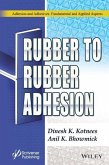A step-by-step introduction to basic principles and practical applications of adhesive bonding, designed for students and professionals alike
Adhesive bonding - the process of joining two surfaces using glues, epoxies, plastic agents, and other adhesives - is a major technique with wide applications in industries as a diverse as aerospace, footwear manufacturing, and food packaging. Adhesive bonding holds several advantages over conventional joining techniques, such as uniform stress concentrations, protection of the bonded surfaces or joints, and the ability to join a variety of different materials and irregular surfaces.
Introduction to Adhesive Bonding provides an accessible overview of the principles and common applications of adhesive bonding. Using a systematic approach, the authors thoroughly explain each step necessary to achieve a successful adhesive bond, including surface preparation, bonding agent selection, design and construction of bonded joints, health and safety considerations, and quality control. Readers are provided with both the theoretical foundation and practical information required to plan and complete their own adhesive bonding projects. This comprehensive yet reader-friendly volume:
_ Highlights the inherent advantages of adhesive bonding in various applications
_ Describes the use of adhesive bonding in the development of novel and advanced projects in different industries
_ Features numerous real-world examples of adhesive bonding in areas such as the transportation industry, civil engineering, medical applications, and sports equipment
_ Discusses how adhesives enable development of new products and constructions of reduced weight and size
_ Identifies important limitations and durability concerns of the use of adhesives in specific applications
Introduction to Adhesive Bonding is an ideal textbook for undergraduate or graduate Engineering and Chemistry programs, and a useful reference for researchers and industry professionals working in fields such as Engineering, Surface and Polymer Chemistry, and Materials Science.
Adhesive bonding - the process of joining two surfaces using glues, epoxies, plastic agents, and other adhesives - is a major technique with wide applications in industries as a diverse as aerospace, footwear manufacturing, and food packaging. Adhesive bonding holds several advantages over conventional joining techniques, such as uniform stress concentrations, protection of the bonded surfaces or joints, and the ability to join a variety of different materials and irregular surfaces.
Introduction to Adhesive Bonding provides an accessible overview of the principles and common applications of adhesive bonding. Using a systematic approach, the authors thoroughly explain each step necessary to achieve a successful adhesive bond, including surface preparation, bonding agent selection, design and construction of bonded joints, health and safety considerations, and quality control. Readers are provided with both the theoretical foundation and practical information required to plan and complete their own adhesive bonding projects. This comprehensive yet reader-friendly volume:
_ Highlights the inherent advantages of adhesive bonding in various applications
_ Describes the use of adhesive bonding in the development of novel and advanced projects in different industries
_ Features numerous real-world examples of adhesive bonding in areas such as the transportation industry, civil engineering, medical applications, and sports equipment
_ Discusses how adhesives enable development of new products and constructions of reduced weight and size
_ Identifies important limitations and durability concerns of the use of adhesives in specific applications
Introduction to Adhesive Bonding is an ideal textbook for undergraduate or graduate Engineering and Chemistry programs, and a useful reference for researchers and industry professionals working in fields such as Engineering, Surface and Polymer Chemistry, and Materials Science.








